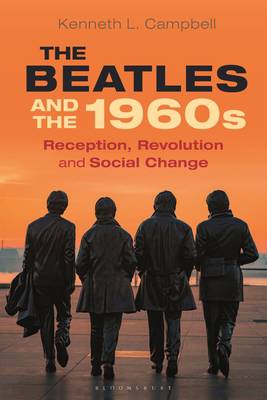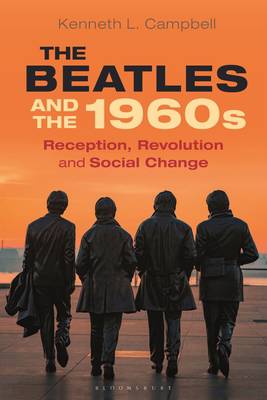
Je cadeautjes zeker op tijd in huis hebben voor de feestdagen? Kom langs in onze winkels en vind het perfecte geschenk!
- Afhalen na 1 uur in een winkel met voorraad
- Gratis thuislevering in België vanaf € 30
- Ruim aanbod met 7 miljoen producten
Je cadeautjes zeker op tijd in huis hebben voor de feestdagen? Kom langs in onze winkels en vind het perfecte geschenk!
- Afhalen na 1 uur in een winkel met voorraad
- Gratis thuislevering in België vanaf € 30
- Ruim aanbod met 7 miljoen producten
Zoeken
The Beatles and the 1960s
Reception, Revolution, and Social Change
Kenneth L Campbell
Hardcover | Engels
€ 169,95
+ 339 punten
Uitvoering
Omschrijving
The Beatles are widely regarded as the foremost and most influential music band in history and their career has been the subject of many biographies. Yet the band's historical significance has not received sustained academic treatment to date. In The Beatles' Reception in the 1960s, Kenneth L. Campbell uses the Beatles as a lens through which to explore the sweeping, panoramic history of the social, cultural and political transformations that occurred in the 1960s. It draws on audience reception theory and untapped primary source material, including student newspapers, to understand how listeners would have interpreted the Beatles' songs and albums not only in Britain and the United States, but also globally.
Taking a year-by-year approach, each chapter analyses the external influences the Beatles absorbed, consciously or unconsciously, from the culture surrounding them. Some key topics include race relations, gender dynamics, political and cultural upheavals, the Vietnam War and the evolution of rock music and popular culture. The book will also address the resurgence of the Beatles' popularity in the 1980s, as well as the relevance of The Beatles' ideals of revolutionary change to our present day.
This is essential reading for anyone looking for an accessible yet rigorous study of the historical relevance of the Beatles in a crucial decade of social change.
Taking a year-by-year approach, each chapter analyses the external influences the Beatles absorbed, consciously or unconsciously, from the culture surrounding them. Some key topics include race relations, gender dynamics, political and cultural upheavals, the Vietnam War and the evolution of rock music and popular culture. The book will also address the resurgence of the Beatles' popularity in the 1980s, as well as the relevance of The Beatles' ideals of revolutionary change to our present day.
This is essential reading for anyone looking for an accessible yet rigorous study of the historical relevance of the Beatles in a crucial decade of social change.
Specificaties
Betrokkenen
- Auteur(s):
- Uitgeverij:
Inhoud
- Aantal bladzijden:
- 280
- Taal:
- Engels
Eigenschappen
- Productcode (EAN):
- 9781350107434
- Verschijningsdatum:
- 9/09/2021
- Uitvoering:
- Hardcover
- Formaat:
- Genaaid
- Afmetingen:
- 156 mm x 234 mm
- Gewicht:
- 566 g

Alleen bij Standaard Boekhandel
+ 339 punten op je klantenkaart van Standaard Boekhandel
Beoordelingen
We publiceren alleen reviews die voldoen aan de voorwaarden voor reviews. Bekijk onze voorwaarden voor reviews.









